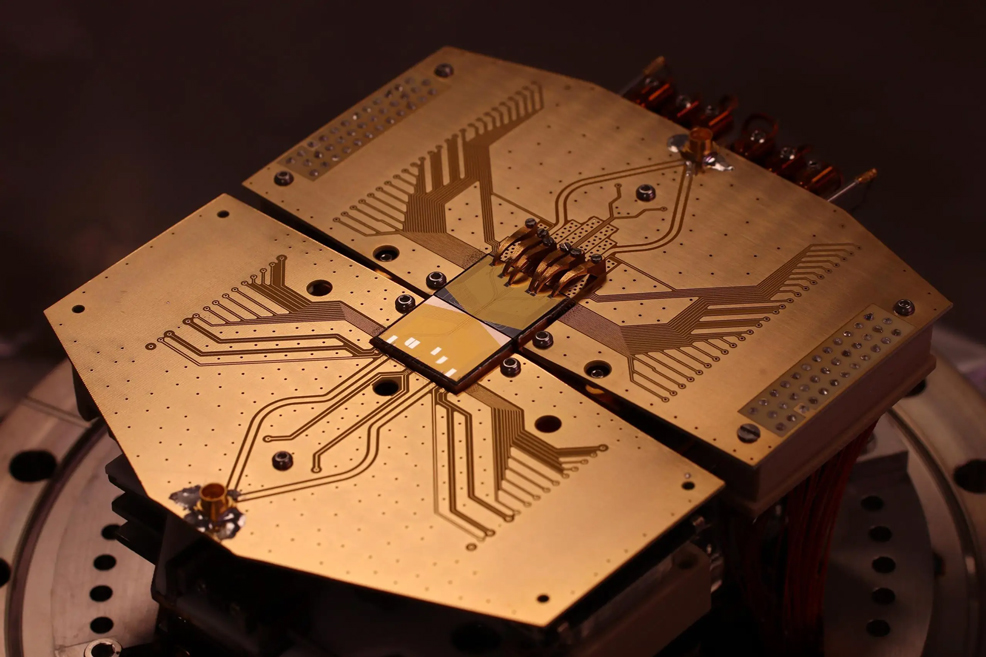
16th February 2023 Direct transfer of quantum bits between chips The first direct transfer of quantum bits between quantum computer microchips has been demonstrated, with a near-perfect accuracy rate and record high connection speed. A research team from the UK says their work has "the potential to scale-up by connecting hundreds or even thousands of quantum computing microchips."
Researchers from the UK's University of Sussex and a spin-out company, Universal Quantum, have demonstrated for the first time that quantum bits (qubits) can directly transfer between quantum computer microchips, and do so with record-breaking speed and accuracy. This breakthrough resolves a major challenge in building quantum computers large and powerful enough to tackle some of the most complex problems facing humanity. Quantum computers have the potential to be vastly more capable than traditional or "classical" computers, thanks to qubits – these can be thought of as equivalent to bits used in your laptop or desktop PC, but with special quantum properties. Rather than existing in binary states of zero or one, qubits can handle multiple values simultaneously, which is known as superposition. Over the last few years, much progress has been made in boosting qubit counts, which are now reaching into the hundreds. However, experts anticipate that millions of qubits will be needed to perform calculations that lead to revolutionary innovations. Such computational power could, for example, help in creating exotic new materials, faster and more effective drug developments, major advances in energy efficiency, breakthroughs in aeronautics, and the ability to make better decisions in finance by handling data sets of enormous complexity. In their research paper, the scientists demonstrate a new and powerful technique, which they dub 'UQ Connect'. This uses electric field links to enable qubits to move from one quantum computing microchip module to another with unprecedented speed and precision. Essentially, it allows the chips to slot together like a jigsaw puzzle to make a more powerful quantum computer. The University of Sussex and Universal Quantum team successfully transported the qubits with 99.999993% accuracy. Ion transport between adjacent modules occurred at a rate of 2,424/s. Both numbers are world records and orders of magnitude better than previous efforts.
Credit: Universal Quantum
"As quantum computers grow, we will eventually be constrained by the microchip's size, which limits the number of quantum bits such a chip can accommodate," explained Winfried Hensinger, Professor of Quantum Technologies at the University of Sussex and the Co-founder of Universal Quantum. "As such, we knew a modular approach was key to make quantum computers powerful enough to solve step-changing industry problems. In demonstrating that we can connect two quantum computing chips – a bit like a jigsaw puzzle – and, crucially, that it works so well, we unlock the potential to scale-up by connecting hundreds or even thousands of quantum computing microchips." "The team has demonstrated fast and coherent ion transfer using quantum matter links," said Dr Mariam Akhtar, who led the work during her time as Research Fellow at the University of Sussex and Quantum Advisor at Universal Quantum. "This experiment validates the unique architecture that Universal Quantum has been developing – providing an exciting route towards truly large-scale quantum computing." "Quantum computers will be pivotal in helping to solve some of the most pressing global issues," said Professor Keith Jones, Pro-Vice Chancellor for Research and Enterprise at the University of Sussex. "We're delighted that Sussex academics are delivering research that offers hope in realising the positive potential of next-generation quantum technology in crucial areas such as sustainability, drug development, and cybersecurity." Universal Quantum has just been awarded €67 million from the German Aerospace Center (DLR) to build two quantum computers, where they will deploy this technology as part of the contract. "The DLR contract was likely one of the largest government quantum computing contracts ever handed out to a single company," said Sebastian Weidt, CEO and Co-founder of Universal Quantum, and a senior lecturer in Quantum Technologies at the University of Sussex. "This is a huge validation of our technology. Universal Quantum is now working hard to deploy this technology in our upcoming commercial machines."
Comments »
If you enjoyed this article, please consider sharing it:
|







